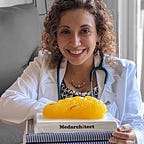Rise. HEAL. Shine. Repeat: One Nurse’s Mission in the Obesity Epidemic
Nermeen Asham, BScN, RN
Happy National Nurses’ Day!!! I’m grateful to be one and to be trained under the McGill Model of Nursing, which is the foundation of what is known today as the Strengths-Based Nursing (SBN) Model.
I still remember our professors telling us we can make a difference wherever we go and the importance of advancing the art and science of nursing through research and innovation. We were reminded by Florence Nightingale, the founder of modern nursing and the first nurse innovator who said, “Ignite the mind’s spark to rise the sun in you.” We learned to be critical thinkers who use a holistic, strength-based approach and therapeutic communication techniques to provide compassionate care. However, we never learned to leave our patients needing help to improve their quality of life or without a referral to a trusted specialist when necessary. So why should we leave our patients with a BMI of ≥ 30.0 kg/m² or a BMI of 25.0 kg/m² — 30.0 kg/m² with an abnormal body fat percentage, putting them at risk for many comorbidities?
As a McGill-trained nurse passionate about health promotion, my motto is “Rise. HEAL. Shine. Repeat.” I want to help everyone know the truth about obesity and learn to HEAL (Handle emotions, embrace challenges & sleep well; Eat mindfully & choose whole foods; Always move & be active; Love people, be present, & meditate).
The Obesity Medicine Association (OMA) defines obesity as “chronic, relapsing, multi-factorial, neurobehavioral disease, wherein an increase in body fat promotes adipose tissue dysfunction and abnormal fat mass physical forces, resulting in adverse metabolic, biomechanical, and psychosocial health consequences.” Before treatment, whether of obesity or other medical conditions, there is health promotion and disease prevention. Benjamin Franklin’s axiom that “an ounce of prevention is worth a pound of cure” still has relevance today. One of my goals is to help others know that there is science behind obesity. We are facing a public health emergency that is caused by the current global obesity epidemic. It’s time to stop believing this myth of “eat less, move more”. Obesity is a serious, chronic, progressive, and multifactorial medical condition, like any other. It is complex that my initial intake form was 33 pages long. That was the only way to paint a clinical picture and understand the true causes of weight gain. Although it led to positive results, it was time-consuming. Then during the COVID pandemic, many people gained weight. I decided to create an online version that is comprehensive, efficient, convenient, automated, and HIPAA compliant known today as the Unraveling Obesity screening tool. Since obesity is affecting people of all ages around the world, my team and I also created pediatric screening tools (kids and teens) in addition to adults. All of our screening tools are multilingual and use people-first language.
My mission at Unraveling Obesity is that our screening tools (for children, adolescents, adults, as well as primary care providers) will help raise awareness about the importance of recognizing obesity as a complex and multifactorial medical condition and will be a starting point for the provider opening up that delicate conversation about weight. Our tools are considered secondary prevention like other health screenings, such as blood pressure monitoring, colonoscopy, pap smear, and mammogram. Our goals include: [1] sharing the truth about obesity and underscoring the importance of this medical condition that needs to be treated by primary care physicians (PCPs) and/or obesity medicine specialists; [2] reinforcing the fact that obesity is a chronic disease yet treatable using a 4 pillar medical framework; [3] encouraging patients who are struggling with pre-obesity or obesity to seek professional help; [4] helping patients have a healthy relationship with food, break the cycle of emotional eating, and overcome obesity; [5] helping PCPs treat weight or refer their patients with pre-obesity and those who are at “high-risk for obesity” to obesity-certified specialists; and [6] providing PCPs with educational material from credible sources about obesity medicine and management to help them with their patients who are suffering from pre-obesity or obesity. The Unraveling Obesity screening tools will ultimately help patients and healthcare professionals realize the importance of taking a preventive approach, which can improve one’s metabolic health and quality of life.
Hence, obesity is a progressive disease affecting nearly every organ in the body and it leads to many medical complications and sequelae. For this reason, I’m helping patients to get screened for obesity early using the Unraveling Obesity screening tool, knowing their risk level and if high-risk seeking help from certified obesity specialists, dealing with their medical condition, understanding the truth about it, and having evidence-based information. It’s time to stop believing the myth of “eat less, move more” and realize we are in a global obesity epidemic causing this public health emergency. A patient’s weight must be assessed, monitored, managed, and treated using a comprehensive and science-based approach, which results in successful and sustainable weight loss. Failure to diagnose, treat, and monitor obesity or having bias or discrimination is unacceptable and unethical. It is the same as failure to diagnose, treat, and monitor coronary artery disease, diabetes, hyperlipidemia, hypertension, and other chronic medical conditions. Weight management must be #1 (a top priority) during an annual physical because obesity leads to many comorbidities. The Unraveling Obesity screening tools triage patients efficiently, thoroughly, accurately, and safely in this public health emergency. As healthcare professionals, let’s make a positive difference as we help patients celebrate success, cope with challenges, and HEAL. May we always remember Maya Angelou’s quote: “People will forget what you said, people will forget what you did, but people will never forget how you made them feel”.
